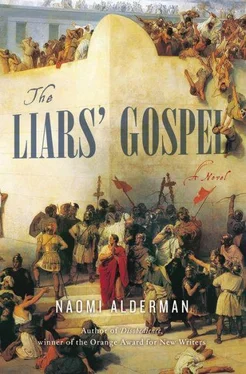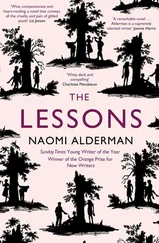It had been many a year, she thought, since she had last made such a journey alone. A young woman would never travel so unprotected. But there was a fierce freedom to it. Who could rob her now? What would they take from her? She had water, and hard bread, and a bag of apples. She kept to the main roads. She told her sons where she had gone and when to expect her return.
She ruminated as she rode. There was such an anger in her heart, she hadn’t known it was there until she was alone on her mule, riding the iron-hard miles. She had never been a bad mother, never truly a bad wife. She’d cared for her children — she flexed her stiff fingers, reminding herself how much it had cost her to care — had made loaves of bread and meal cakes and soups and roasted meat and dried fruits, had washed the children and kept them free from disease, had lain with her husband even when she was tired or unwilling because these are the duties of a wife and a mother. She had vanished into it and not accounted it a loss. This is who she was: a mother.
And this child could not pay her the duties of a son? Not to visit her in glory with his mighty crowd of men? Not to give her a place at his table? Not to write to her or send word to her after all she had done? From the first red scored line that had popped open across her belly when she grew big with him to the last bowl of soup she had made for him before he vanished, was all of this nothing?
Her soul grew bitter as the miles passed and when she arrived at the encampment — there was no mistaking it, five hundred travelers make smell and noise and smoke — she felt as tough and unyielding as the frozen earth.
“Where is the tent of Yehoshuah of Natzaret?” she said to a Roman hanger-on with fine clothes.
“Who are you to ask?”
“I am his mother,” she said.
The first they know of it is that the long barn is on fire. The barn at the edge of the village, the first one you come to if you’re walking from the south. There are cries in the street of “fire, fire” and Miryam runs out like everyone else, carrying her bucket, ready to be part of a chain down to the river. It has been dry these past few weeks — a stray cinder from a careless fire could have set the barn ablaze.
They begin to run down the hill to the barn, barefooted mostly on the chalk-dry baked earth. Calling to one another that they should make for the river to bring water. And they see the crested plumes and the glittering spears and they hear the sound of the phalanx. And they are afraid.
It is only a scouting party, ten men with a guide who speaks the native language. Rome does not send its finest and best to seek out a small village sixty-five miles from Jerusalem. But even a scouting party brings with it the authority of those who sent it, the invisible chain stretching back from these ten to the centurions garrisoned at the capital, and from there to the Prefect, and from there to the Emperor himself. If these men are not satisfied, others will come. If those are not satisfied, more men will come. Eventually Rome will have its answer, or the place will be reduced to a bloody smear upon smoldering earth.
This is why they have burned the barn. It is not your barn, they are saying. It is ours. Rome owns you.
They come to a halt in the town square. The people gather there too. There is nothing to do now about the barn or the stores that will be lost.
The leader of the soldiers makes a brief statement. The people of the village do not understand the language. Some of them, those who go to the larger cities to trade, have learned a few words, but this speech is fast and complex.
They know the translator. He is a man who works for the tax overseer in Galilee. They have seen him often. He never brings good news. It is no surprise to see him now with the Roman soldiers; he has come before with mercenaries to exact his payments.
This time, he attempts to pretend that he is their friend. The Romans do not understand what he is saying, the people do not understand what the Romans have said. There is no way to be sure that he is even communicating the true message.
“They’ve brought me here,” he says, “because they’re looking for people who fled Yaffo. In the uprising a few months ago, I know you heard about it. Now, I’ve tried to reason with them, tried to persuade them. You’re good people, you pay your taxes on time, you don’t make trouble. But they’ve heard the rumor that a boy from Yaffo is living in the village now. A new boy. And I’m sure you don’t want to harbor known criminals, not in a quiet place like Natzaret! So my best advice is, hand him over. They’ll take him away and ask him questions and leave you alone. You might even have time to save some of the”—he inclines his head faintly towards the barn—“some of it, perhaps.”
They look around at one another. Gidon is not there, he is in the hills with the new lambs, he will be there for a day or two probably. Miryam wonders if any of them will speak.
“He is living with me,” she says, loudly and suddenly, surprising even herself a little. “But he is not the man you’re seeking.”
The tax collector smiles. The gold ring glitters on his thumb.
“Mother Miryam, I would never have thought it of you! Well, hand him over and we’ll be on our way.”
Miryam sees her brother Shmuel shift in the crowd. He would go and get the boy now, she realizes. He would mount a pony and gallop into the hills to find him and give him to the Romans.
“No,” she says, “he is not the man you want.”
Shmuel’s body stiffens. He tries to catch her eye, to mouth something to her.
“We’ll have to judge that ourselves, Mother Miryam.”
“No,” she says.
And something in the atmosphere turns. Perhaps it is that one of the soldiers fingers his spear, not understanding the conversation but hearing something in her tone.
The lead soldier bends to whisper a word or two in the tax collector’s ear. The man nods.
“If you can’t produce him, Mother Miryam,” he says, and his voice is hard now, “we will take you instead. For questioning.”
She tightens the muscles in her stomach. She will need to lie.
When she came in to see him, she found she was singing a song under her breath. It was a psalm, set to a tune the goat herders sing. She used to sing it to Yehoshuah when he was a tiny baby and perhaps some part of her thought that it would turn him back to the child he was, and he would remember how he used to need her.
He was sitting with three of his men, and when he saw her he frowned and she realized that for a moment he did not recognize her. Oh, this was heavy and cold. But at last, within a heartbeat, his face broke into a smile.
“Mother,” he said.
They walked together, to soothe her sore legs, stiff from the ride. She told him at first all the news of the family, the nieces and nephews and the doings of the village. He listened but he seemed distant. He replied, “That is good,” to news of a good harvest or “Those are sad tidings,” to a death in childbed.
“And what of you?” she said at last. “Here you are, a mighty man with many followers.”
She took his arm in hers and hugged it. “Are you going to set up a great school and be a teacher? I would be so proud to tell the people at home that you had founded a college, taken a wife…” She lets her voice trail off.
He paused his walking. She stopped too. He bent down so his face was level with hers.
“Mother,” he said, “God has called me. He has told me to go to Jerusalem at Passover, because it is time for a new heaven and a new earth.”
His eyes were unblinking. His face shone like the moon. There was a smudge of dirt in the center of his forehead.
She felt suddenly impatient.
Читать дальше












